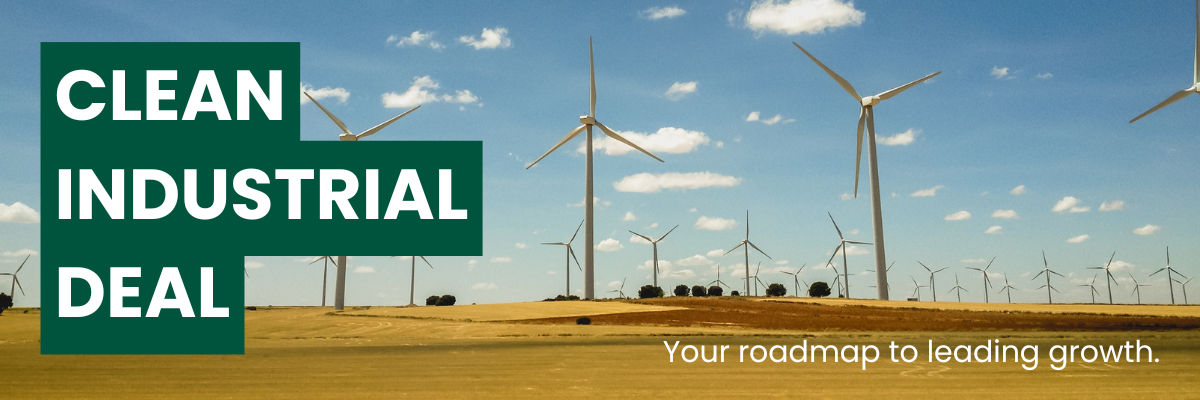
Written by Jan Van Braeken
Dear reader,
Welcome to Publyon’s EU Digital Policy Update (DPU). The temperature is rising, summer is around the corner and the political climate is heating up like never before. In this edition, we are happy to provide you with insights on the latest EU policy trends and developments to keep you informed. We cover the recently launched International Digital Strategy, the deadline of escalated trade tensions is approaching and China’s technologies might compromise European energy infrastructure. And as always, we dive into the latest AI, cyber, and other digital policy news.
Europe’s bold plan for sustainable growth, the “Clean Industrial Deal”, represents a major shift for EU businesses, especially in energy-intensive sectors. Don’t miss your chance to engage with the Commission to shape this deal and influence the policy direction for the next five years.

The spotlight
Trump, tariffs, and tech: Countdown to uncertainty and Europe’s measured response
European trade is once again steering towards a period of uncertainty. At the G7 summit in Canada on 16 June, European Commission President Ursula von der Leyen and European Council President António Costa urged the United States to avoid escalating trade tensions, warning that a renewed tariff conflict would threaten global economic stability. The possible reintroduction of United States tariffs on steel and aluminium, with a decision anticipated by 9 July, has prompted the European Commission to prepare countermeasures. While digital products and services are not directly targeted, businesses across Europe’s tech ecosystem are already facing questions over cost volatility, investment delays, and potential disruption to cross-border supply chains.
Digital tech as a strategy
At the same time, the European Union is responding with strategic policy rather than reactive protectionism. On 5 June, the Commission launched its International Digital Strategy, a blueprint to reinforce the EU’s digital presence on the global stage. The strategy prioritises trusted partnerships on artificial intelligence, semiconductors, cybersecurity, advanced connectivity, quantum technologies and secure cloud infrastructure. It backs these objectives with concrete cooperation frameworks and new international investment initiatives. European businesses are encouraged to engage early in actions covering AI safety testing, semiconductor research, digital infrastructure and secure data flows, in collaboration with partners such as Japan, India, Canada and the Republic of Korea.
EU fuels innovation and scale ups
For entrepreneurs and innovators, the Startup and Scaleup Strategy creates new opportunities to grow. Flagship measures include the Scaleup Europe Fund, the Blue Carpet talent initiative and a European Innovation Investment Pact designed to attract private capital into emerging technologies. Startups will also gain better access to public infrastructure through the new Charter of Access and support from the European Innovation Council in scaling promising technologies from the laboratory to global markets.
In short, while short-term trade tensions are challenging Europe’s economic stability, the EU is laying the groundwork for long-term competitiveness through coordinated investment, regulatory reform and international digital leadership. For companies operating in the tech and digital space, now is the time to assess exposure to shifting trade dynamics and engage proactively with the new strategies shaping Europe’s digital future.
Do you have questions about how these developments impact your business, or how to draft effective input for the consultation on potential countermeasures? Do not hesitate to reach out to our Director Cathy Kremer c.kremer@publyon.com.

Impact analysis for your business
Our free policy updates keep you informed, but is that enough? With our tailored EU Digital Policy Updates you’ll receive:
- Custom insights on how upcoming policy changes might impact your business;
- Strategic advice from your dedicated policy consultant on how to turn challenges into opportunities;
- Early warnings about key legislative developments.

Geopolitical corner
In Publyon’s geopolitical corner, we explore how geopolitics intertwines with digital (policy) developments. Read on to learn more about what the hottest topics were this month!
NATO summit around the corner
The 2025 NATO Summit will be held in The Hague on 24 to 26 June as geopolitical tensions are rising in the run up, Secretary General Mark Rutte already expressed his wish for NATO members to “make bold decisions to make NATO stronger, fairer and more lethal.” Rutte hereby wishes to set a new goal of 5% of GDP on defence spending by 2032. Currently, only 23 out of 32 NATO members reach the current 2% threshold with American President Trump accusing many European nations of freeloading and benefitting from the American defence umbrella.
In order to help European countries bolster their spending, the European Commission proposed looser budget rules within a 150-billion-euro defence fund. This paves the way for more national investments in conventional military applications as well as stronger cyber and hybrid defences. In addition, 19 EU Member States approved the sixth wave of PESCO (Permanent Structured Cooperation) projects covering a wide range of strategic applications such as cyber, soldier systems and medical facilities. Germany, France, Italy and Finland are in the lead and will coordinate this project to ensure full enrolment of the project.
This will benefit suppliers and businesses as they’ll be able to apply for tenders, invest in innovation and R&D, and access broader markets.
Watch your panels!
With spring in the air, it’s the perfect time for solar panels to operate at full capacity. But be warned! American officials have discovered communication devices or “kill-switches” in Chinese-made solar inverters, sparking fears they could be used to sabotage power grids. These components, undetected in official documentation, could bypass firewalls and allow remote shutdowns or blackouts. The American government hasn’t publicly confirmed the findings yet. In the meantime an American bill aims to ban the purchase of Chinese batteries from 2027 onwards with targeted companies including major players such as CATL and BYD. Chinese inverter brands could also be added to this blacklist as well.
Meanwhile, European energy infrastructure is heavily reliant on Chinese technology leading to great concerns over the strategic autonomy and the dependence on foreign technology. According Christoph Podewils, Secretary General of European Solar Manufacturing Council, more than 200 gigawatts of solar capacity are potentially exposed to interference with Chinese technology meaning that even small disruptions could trigger widespread blackouts. This should incentivise European businesses and governments to reconsider their energy infrastructure. As geopolitical tensions rise, the pressure grows to reduce dependence on foreign suppliers before critical infrastructure is compromised.
Commission takes precautionary measures on digital infrastructure
Meanwhile, the European Commission is stepping up efforts to protect its critical digital infrastructure by investing further in subsea cables while formally proposing Chinese telecom firm Huawei from involvement in the deployment and maintenance of submarine networks. European Vice President and Tech Commissioner Henna Virkkunen aims to mitigate the risks associated with over-reliance on high-risk vendors. This implicitly targets Chinese tech giants Huawei and ZTE. This move marks yet another chapter in escalating tensions between the European Commission and Huawei, coinciding with an ongoing investigation by Belgian prosecutors into alleged bribery of MEPs by the Chinese company.

Policy updates
UK unveils major AI investment package during London Tech Week
On 10 June, the UK Government announced a series of major private-sector investments into artificial intelligence, fintech, and digital infrastructure, totalling more than £2 billion. These include a £1.5 billion commitment from Liquidity, a €200 million UK AI factory from Dutch firm Nebius, and expansion plans from InnovX AI, Ekimetrics and Yuno. Accompanying measures include £25 million for new Turing AI Global Fellowships, a £1 billion AI Research Resource, and an expansion of the Encode: AI for Science programme. These investments are set to underpin the UK’s forthcoming Industrial Strategy, with a strong focus on digital skills, talent retention and frontier science.
Commission launches consultation on high-risk AI rules under AI Act
On 6 June, the European Commission opened a six-week public consultation on the implementation of high-risk system provisions under the AI Act. The process seeks input from developers, deployers and regulators on classification challenges, value chain responsibilities, and the interface with existing product safety legislation. The consultation, which runs until 18 July, will feed into forthcoming Commission guidelines and delegated acts. Businesses working with AI in regulated domains should prepare to demonstrate how their systems comply with the high-risk framework.
First funding calls under GenAI4EU open to stakeholders
On 10 June, the European Commission launched the first tranche of Horizon Europe and Digital Europe calls under its GenAI4EU initiative, providing almost €700 million to integrate generative AI into key sectors such as health, energy, manufacturing and mobility. The calls focus on practical deployment, with funding available for general-purpose AI, virtual worlds, robotics, digital twins, battery testing and logistics applications. Deadlines range from September 2025 to February 2026. The initiative is intended to strengthen the EU’s strategic autonomy in AI, and businesses are encouraged to participate early in consortia-building.
Consultation open on new Cloud and AI Development Act
Since 9 April, the Commission has been gathering feedback on the proposed Cloud and AI Development Act, part of its broader AI Continent strategy. The Act aims to triple Europe’s compute capacity by accelerating investment in green data centres, securing chip supply, and enhancing the cybersecurity and resilience of cloud providers. The consultation period runs until 3 July, with legislative adoption expected in Q4 2025. Companies providing cloud services or operating AI-intensive infrastructure should assess how future obligations could impact data localisation, transparency and energy sourcing.
Water resilience rules expected to impact digital infrastructure
On 11 June, the European Commission published its long-awaited European Water Resilience Strategy, which outlines stricter water management expectations for high-consumption sectors, including data centres and cloud infrastructure. The strategy highlights the tech sector’s rising demand on water resources, particularly for cooling in hyperscale AI and cloud facilities. It explicitly flags the need for minimum performance requirements on water efficiency for digital infrastructure, and calls for mandatory public disclosure of water use and risks as part of broader corporate sustainability obligations. Forthcoming measures may include conditional permitting, integration into climate adaptation plans, and prioritisation of circular water use.
EU adopts new Cyber Crisis Management Plan
On 30 May, the Council approved the EU’s updated Cybersecurity Blueprint, setting out a unified approach to managing large-scale and cross-border cyber incidents. The plan outlines concrete coordination protocols between national authorities, EU institutions and private-sector operators, based on a tiered incident classification system. Notably, the strategy places significant emphasis on involving key digital infrastructure actors such as data centres, cloud providers and digital platforms in the joint situational awareness and response chain. Businesses with digital infrastructure critical to public or economic stability should assess how the Blueprint’s activation mechanism and coordination measures may impact crisis preparedness and operational continuity planning.
Commission gathers feedback on upcoming Digital Networks Act
On 6 June, the European Commission launched a call for evidence on the forthcoming Digital Networks Act, aimed at addressing persistent investment, deployment and regulatory barriers in Europe’s electronic communications sector. The proposal is expected by the end of 2025 and will build on the Commission’s 2024 White Paper on digital infrastructure needs. Together with the review of the European Electronic Communications Code, it seeks to streamline rules, improve access to advanced networks such as fibre and 5G/6G, and foster an integrated single market. The consultation also explores solutions for financing and cross-border network access and is open for feedback until 11 July.

Events
Interested in where we are star hopping in the coming period? Our colleague Jan Van Braeken will attend European Campaign Playbook AI workshop on 4 July, and Marc Lütz will be attending the Tech & Tonic event on ‘What if Governments bought innovation, not just things?’ on 26 June.
We are always eager to have a chat about the latest Digital Policy Update and other digital and tech news with our fellow digital policy enthusiasts. If you are interested in meeting our digital and tech team, do not hesitate to reach out to us.





